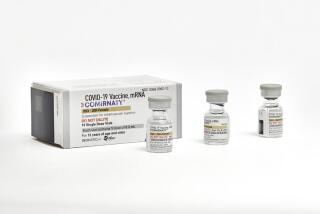Cancer Study Called Valid Despite Fraud : Medicine: Findings on the effectiveness of lumpectomies rather than mastectomies are upheld even though one researcher falsified data, officials say.
- Share via
Federal officials and cancer experts worked quickly to reassure American women that despite reports of fraud by one researcher in a major breast cancer study, the findings--that lumpectomy is often just as effective as complete mastectomy in early cancer cases--are still valid.
Many officials also expressed astonishment that the fraud, revealed nine months ago, has now triggered a public controversy.
“The case is a year old and closed out for some time,” said Lyle Bivens, head of the Office of Research Integrity at the Department of Health and Human Services, which released its report on the incident in June, 1993.
An article on the report in Sunday’s editions of the Chicago Tribune cast doubt on the credibility of the study findings, published in the New England Journal of Medicine in 1989.
But officials of the National Cancer Institute said Monday that when the researcher’s data is removed from the overall study the conclusions are the same: Lumpectomy is as effective as more disfiguring radical mastectomy.
“Breast conservation can be used with confidence,” said Joann Schellenbach, a spokeswoman for the American Cancer Society. The landmark National Surgical Adjuvant Breast and Bowel Project, headed by Pittsburgh surgeon Bernard Fisher, involved 5,000 patients at nearly 500 medical centers.
One researcher, Roger Poisson of St. Luc’s Hospital in Montreal, has admitted to falsifying records concerning more than 100 patients to make them eligible for inclusion in the study. Poisson has been barred from receiving any U.S. research grants for eight years.
Poisson’s work accounted for about 16% of the patients in the study.
“We put him out of business real quick,” said Don McLaren, deputy associate commissioner for public affairs for the Food and Drug Administration, which regulates the experimental drug tamoxifen, which was used in some of Poisson’s studies. In an agreement signed May 15, 1991, Poisson admitted that he had violated FDA regulations governing the use of investigational drugs.
Bivens said that when his report was released, his staff recommended that the researchers notify scientific journals of the fraud.
Fraud investigators expected to see a quick correction from the Pittsburgh researchers. To date, none has been published or received by medical journals. “(We) were surprised to find that nothing had happened in a year,” said Dorothy McFarland, who headed the Poisson investigation for the Office of Research Integrity.
The Pittsburgh researchers said that preparing a new paper based on a thorough reanalysis of their data has taken a great deal of time but that they are about to approach journals.






